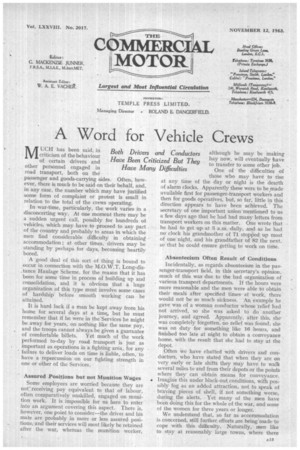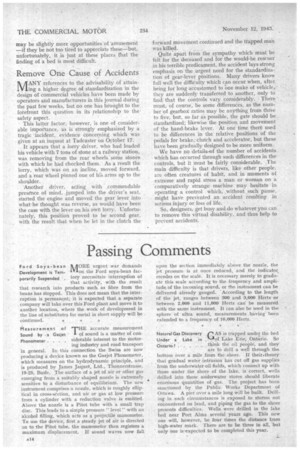A Word for Vehicle Crews
Page 15

Page 16

If you've noticed an error in this article please click here to report it so we can fix it.
Both Drivers and Conductors Have Been Criticized But They Have Many Difficulties
MUCH has been said, in criticism of the behaviour of certain drivers and other personnel engaged in road transport, both on the passenger and goods-carrying sides. Often, however, there is much to be said on their behalf, and, in any case, the number which may have justified some form of complaint or protest is small in relation to the total of the crews operating.
In war-time, particularly, the work varies in a disconcerting way. At one moment there may be a sudden urgent call, possibly for hundreds of. vehicles, which may have to proceed to any part of the country and probably to areas in which the men find considerable difficulty in obtaining accommodation ; at other times, drivers may be standing by perhaps for days, becoming heartily bored.
A good deal of this sort of thing is bound to occur in connection with the M.O.W.T: Long-dis.tance Haulage Scheme, for the reason that it has been for some time in process of building up and consolidation, and it is obvious that a huge organization .of this type must involve some cases of hardship before smooth working can be attained.
It is hard luck if a man be kept away from his home for several days at a time„ but he must remember that if he were in the'Services he might be away for years, on nothing like the same pay, and the troops cannot always be given a guarantee of comfortable billets. Yet much of the work performed to-day by road transport is just as important as operations in a fighting area, for any ' failure to deliver loads on time is liable, often, to have a repercussion on our fighting strength in one or other of the Services.
Assured Positions but not Munition Wages Some employees are worried because they are not receiving pay equivalent to that of labour, often comparatively unskilled, engaged on munition work. It is impossible for us here to enter into an argument covering this aspect. There is, however, one point to consider—the drivel and his mate are probably in more or less assured positions, and their services will most likely be retained after the war, whereas the munition worker,
although he may be making hay now, will eventually have to transfer to some other job. One of the difficulties of those who may have to rise at any time of the day or night is the dearth of alarm clocks. Apparently these were to be made available first for passenger-transport workers and then for goods operatives, but, so far, little in thi direction appears to have been achieved. The secretary of one important union mentioned to us a few days ago that he had had many letters from transport workers on this matter. One wrote that he had to get up at 3 a.m. daily, and as he had no clock his grandmother of Ti stopped up most of one night, and his grandfather of 82 the next, so that he could ensure getting to work on time.
Absenteeism Often Result of Conditions
Incidentally, as regards absenteeism in the passenger-transport field, in this secretary's opinion, much of this was due to the bad organization of various transport departments. If the hours were more reasonable and the men were able to obtain their meals after specified times. at work, there would not be so much sickness. An example he gave was of a woman conductor whose relief had not arrived, so she was asked to do another journey, and agreed. Apparently, after this, she was completely forgotten, no relief was found, she was on duty for something like 10 hours, and finished too late at night to obtain a conveyance home, with the result that she had to stay at the depot.
Often we have chatted with drivers and conductors, who have stated that when theY are on very early or late shift they may have to walk several miles to and from their depots or the points where they can obtain means for conveyance.
. Imagine this under black-out conditions, with possibly fog as an added 'attraction, not to speak of braving pieces of shell, if not something worse, during the alerts. Yet many of the men have been doing this for the whole of the war, and some of the women for three years or longer.
We understand that, so far as accommodation is concerned, still further, efforts are being made to cope with this difficulty. Naturally, men like to .stay at reasonably large towns, where there may be slightly more opportunities of amusement —if they be not to tired to appreciate these—but, unfortunately, it is just at these places t'hat the finding of a bed is most difficult.
•• Remove One Cause of Accidents
MANY references to the advisability of attaining a higher degree of standardization in the design of commercial vehicles. have been made by operators and manufacturers in this journal during the past few weeks, but no one has brought to the forefront this question in its relationship to the safety aspect.
This latter factor, however, is one of considerable importance, as is strongly emphasized by a tragic incident, evidence concerning which was given at an inquest at Tadcaster on October 17.
It appears that a lorry driver, who had loaded his vehicle with 7 tons of stone at a railway station, was removing from the rear wheels some stones with which he had chocked them. As a result the lorry, which was on an incline, moved forward, and a rear wheel pinned one of. hi S arms up to the shoulder.
'Another driver, acting with . commendable presence of mind, jumped into the driver's seat, started the engine and moved the gear lever into whathe thought was reverse, as would have been the case with the lever on his own lOrry. Unfortunately, this position proved to be second gear, with the result that when he let in the clutch the forward movement continued and the trapped man was killed. Quite apart frOm the sympathy which must be felt for the deceased and for the would-be rescuer in his terrible predicament, the accident lays strong emphasis on the urgent need for the standardization of gear-lever positions. Many drivers know full well the difficulty, which can occur when, after being for long accustomed to one make of vehicle,they are suddenly transferred to another, only to find that the controls vary considerably. There must, of course, be some differences, as the number of gearbox ratios may be anything from three to five, but, so far as possible, the gate should be standardized; likewise the position and movement of the hand-brake lever. At one time there used to be differences in the relative positions of the pedals for brake, clutch and accelerator, but these have been gradually designed to be more uniform.
We have no details4of the number of accidents which has occurred through such differences in the controls, but it must be fairly considerable. .The main difficulty is that drivers, like other people, are often creatures of habit, and in moments of extreme and rapid stress a man or woman on a 'comparatively strange machine may hesitate in operating a control which, ,without such pause, might have prevented , an accident resulting in serious injury OT loss Of life.
So, designers, get busy and do whatever yon can to remove this virtual disability, and thus help to prevent accidents.




















































